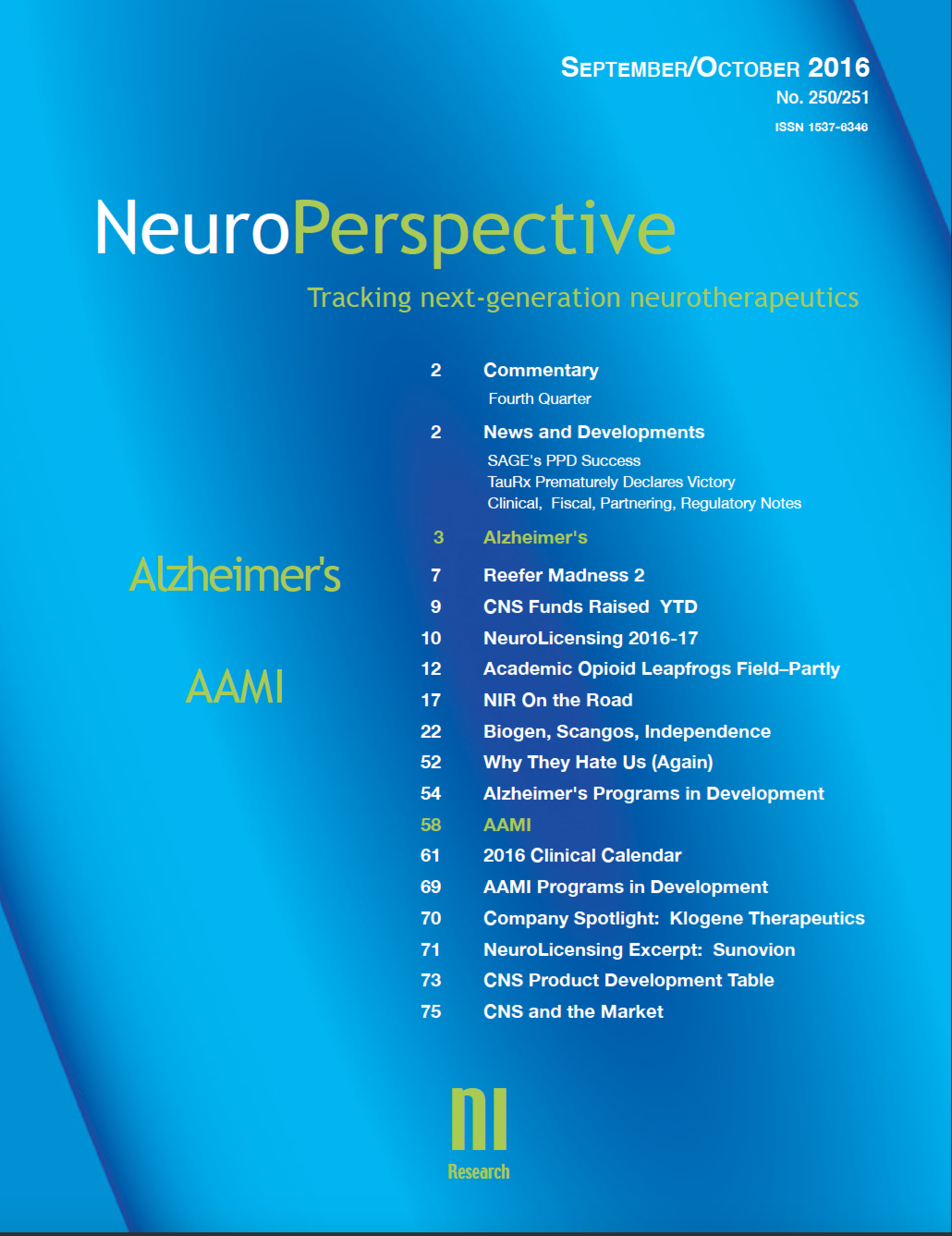NeuroPerspective has released its Winter 2025 issue, featuring our comprehensive Review of 2024 and Preview of 2025 for the neurotherapeutics area.
In terms of 2024, the availabilities of Eisai/Biogen’s Leqembi and Lilly’s Kisunla constitute a dress rehearsal, for the eventual availability of genuinely impactful disease-modifiers for Alzheimer’s. The risks are more easily quantified than their benefit, which we believe will be captured by the modal familial assessment:’ I can’t tell if it’s helping or not.’
Otherwise, disease-slowing in neurodegeneration is still a work in early process, with yet-to-be-validated research in neuroinflammation and protein clearance standing out. We had been anticipating 2024’s PhII readouts from AbbVie/Alector in Alzheimer’s, and Roche/Prothena in Parkinson’s, and while both studies failed, Roche and Prothena believe some signal was seen in the latter. FTD-GRN may be the next high-profile context for disease-modifier development, with GSK/Alector producing important results at year-end or early in 2026. Programs from Vesper Bio, Takeda/Denali, Astellas, Passage Bio, and Arkuda/JNJ are earlier stage.
The highest level drama in neurotherapeutics is in Psychiatry. The Winter issue explores the dfferences between some of the muscarinic compounds in pursuit of BMS/Karuna’s Cobenfy, in light of the failure of AbbVie/Cerevel’s emraclidine in schizophrenia and Neurocrine’s PhII positive findings. We continue to believe that, over the next two to four years, the clinical practice of Psychiatry is going to be revolutionized, first in schizophrenia, but then in depression. The failure of Neumora’s first PhIII for navacaprant, and Alto’s PhII for ALTO-100, are a reminder that the barrier to entry remains quite high, but several programs are going to report results this year, including JNJ and Autobahn.
Other areas where significant progress has been made include severe epilepsies, with PhII success reported for Lundbeck/Longboard’s bexicaserin, and for the lead assets from Neurvati/GRIN Therapeutics and Praxis Therapeutics. Despite the very skimpy funding available to novel pain therapy programs, Vertex’s VX-548 appears on track to approval as a useful nonopioid acute pain option.
2024 saw the inevitable failures of some neurodegeneration programs based on fictitious (Cassava and Athira) or dubious premises (Annovis), though corporate denial is still in full stride for the latter.
The Winter Issue includes our customary ‘Psychedelics Update’, as that sector encounters resistance from regulators ill-equipped to assess therapeutics that rely so heavily upon synergistic combinations of drug and psychotherapy. The FDA’s rejection of Lykos’ NDA signals a backlash of sorts, and psychedelic drug developers have scrambled to avoid the pitfalls that swallowed up the Lykos application: Compass will have critical PhIII results for psilocybin by mid-year, MindMed has moved into PhIII with LSD, Cybin, Gilgamesh, Reunion, and Atai are among several which have important datasets coming over the next eighteen months.
There are some ‘Lowlights’ also discussed in the Winter Issue, among them the failure of core programs from Sage Therapeutics and Sage’s surprising passivity in the face of these setbacks.
The companies covered in the Winter Issue are include those that represent the best and most accomplished of current neuroscience, some that epitomize the risks and aspirations of R&D, and the inevitable bevy of companies for whom ‘post hoc’ is a way of life. Just a few of the 200+ programs with summaries of their progress and prospects are:
AbbVie, Acadia, Alector, Anavex, Atai, Biogen, Biohaven, Bionomics, Boehringer Ingelheim, BMS, Cassava, Cybin, Engrail, Denali, Eisai, Harmony, HMNC, Intra-Cellular, Janssen/JNJ, LillyLundbeck, Maplight, Merck, MindMed, Neumora, Neuren, Neurocrine, Noema, Nxera, Otsuka, Ovid, Prothena, Remedy, Roche, Sage, Seaport Therapeutics, Takeda, Transposon, UCB.
There are reviews of significant clinical, fiscal, partnering/acquisition events and trends, valuation winners and losers. 42 pages.
Published since 1995, NeuroPerspective is the quarterly review of the neurotherapeutics area offering essential, unique, and comprehensive coverage of developments in the science and the business of the CNS sector. Among our 2025 Feature Reviews will be Schizophrenia, ALS, Parkinson’s, and Alzheimer’s.
A one-year (1-5 user) subscription to NeuroPerspective is $3300. A 6-10 user subscription is $5500. Other customized user base and startup pricing options are available. Orders with immediate download availability can be made at our website, https://www.niresearch.com/onlinestore.html.
The Winter issue is being made available as a single issue purchase, US$900.

